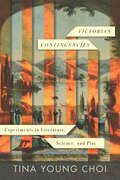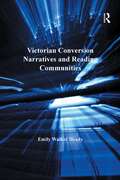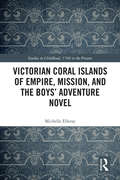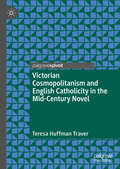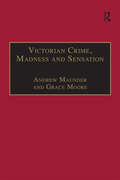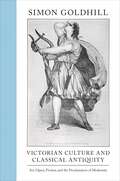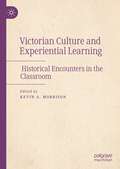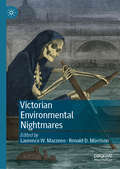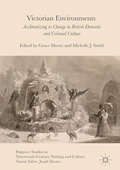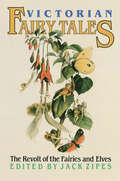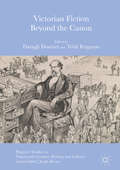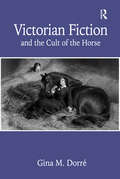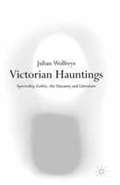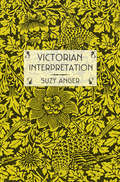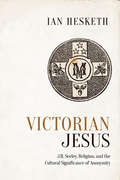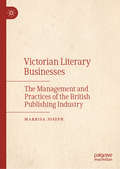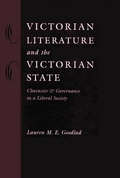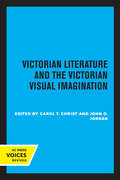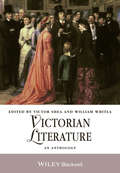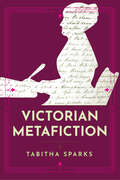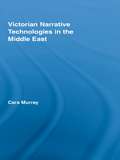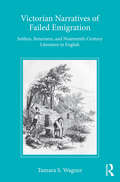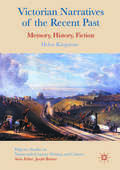- Table View
- List View
Victorian Contingencies: Experiments in Literature, Science, and Play
by Tina Young ChoiContingency is not just a feature of modern politics, finance, and culture—by thinking contingently, nineteenth-century Britons rewrote familiar narratives and upended forgone conclusions. Victorian Contingencies shows how scientists, novelists, and consumers engaged in new formal and material experiments with cause and effect, past and present, that actively undermined routine certainties. Tina Young Choi traces contingency across a wide range of materials and media, from newspaper advertisements and children's stories to well-known novels, scientific discoveries, technological innovations. She shows how Charles Lyell and Charles Darwin reinvented geological and natural histories as spaces for temporal and causal experimentation, while the nascent insurance industry influenced Charles Babbage's computational designs for a machine capable of responding to a contingent future. Choi pairs novelists George Eliot and Lewis Carroll with physicist James Clerk Maxwell, demonstrating how they introduced possibility and probability into once-assured literary and scientific narratives. And she explores the popular board games and pre-cinematic visual entertainments that encouraged Victorians to navigate a world made newly uncertain. By locating contingency within these cultural contexts, this book invites a deep and multidisciplinary reassessment of the longer histories of causality, closure, and chance.
Victorian Conversion Narratives and Reading Communities
by Emily Walker HeadyBecause Victorian authors rarely discuss conversion experiences separately from the modes in which they are narrated, Emily Walker Heady argues that the conversion narrative became, in effect, a form of literary criticism. Literary conventions, in turn, served the reciprocal function as a means of discussing the nature of what Heady calls the 'heart-change.' Heady reads canonical authors such as John Henry Newman, Charles Dickens, Charlotte Brontë, George Eliot, and Oscar Wilde through a dual lens of literary history and post-liberal theology. As Heady shows, these authors question the ability of realism to contain the emotionally freighted and often jarring plot lines that characterize conversion. In so doing, they explore the limits of narrative form while also shedding light on the ways in which conversion narratives address and often disrupt the reading communities in which they occur.
Victorian Coral Islands of Empire, Mission, and the Boys’ Adventure Novel (Studies in Childhood, 1700 to the Present)
by Michelle EllerayAttending to the mid-Victorian boys’ adventure novel and its connections with missionary culture, Michelle Elleray investigates how empire was conveyed to Victorian children in popular forms, with a focus on the South Pacific as a key location of adventure tales and missionary efforts. The volume draws on an evangelical narrative about the formation of coral islands to demonstrate that missionary investments in the socially marginal (the young, the working class, the racial other) generated new forms of agency that are legible in the mid-Victorian boys’ adventure novel, even as that agency was subordinated to Christian values identified with the British middle class. Situating novels by Frederick Marryat, R. M. Ballantyne and W. H. G. Kingston in the periodical culture of the missionary enterprise, this volume newly historicizes British children’s textual interactions with the South Pacific and its peoples. Although the mid-Victorian authors examined here portray British presence in imperial spaces as a moral imperative, our understanding of the "adventurer" is transformed from the plucky explorer to the cynical mercenary through Robert Louis Stevenson, who provides a late-nineteenth-century critique of the imperial and missionary assumptions that subtended the mid-Victorian boys’ adventure novel of his youth.
Victorian Cosmopolitanism and English Catholicity in the Mid-Century Novel
by Teresa Huffman TraverVictorian Cosmopolitanism and English Catholicity in the Mid-Century Novel argues that the Creedal doctrines of “the communion of saints” and the “holy Catholic Church” provided Victorian novelists—both Roman Catholic and Protestant—with a means of exploring religious forms of cosmopolitanism. Building on research exploring the divisions between Roman Catholicism and Protestantism in Victorian literature and culture, Teresa Huffman Traver considers the extent to which anti-Catholicism, domesticity, and national identity were linked. Huffman Traver connects this research with cosmopolitan theory, and analyzes how the conception of Catholicity could be used to reach beyond national identity towards a transnational community. Investigating the idea of a “rooted” cosmopolitanism, grounded in the local and limited in scope, this Pivot book offers a new angle on how religion, domesticity, and national identity were constructed in nineteenth-century British culture.
Victorian Crime, Madness and Sensation (The Nineteenth Century Series)
by Andrew MaunderBeginning with Victoria's enthronement and an exploration of sensationalist accounts of attacks on the Queen, and ending with the notorious case of a fin-de-siècle killer, Victorian Crime, Madness and Sensation throws new light on nineteenth-century attitudes toward crime and 'deviance'. The essays, which draw on both canonical and liminal texts, examine the Victorian fascination with criminal psychology and pathology, engaging with real life cases alongside fictional accounts by writers as diverse as Ainsworth, Stevenson, and Stoker. Among the topics are shifting definitions of criminality and the ways in which discourses surrounding crime changed during the nineteenth century, the literal and social criminalization of particular sex acts, and the gendering of degeneration and insanity. As fascinated as they were with criminality, the Victorians were equally concerned with solving crime, and this collection also focuses on the forces of law enforcement and nineteenth-century attempts to "read" the criminal body as revealed in Victorian crime fiction and reportage. Contributors engage with the detective figure and his growing professionalization, while examining the role of science and technology - both at home and in the Empire - in solving cases.
Victorian Culture and Classical Antiquity: Art, Opera, Fiction, and the Proclamation of Modernity (Martin Classical Lectures #29)
by Simon GoldhillHow did the Victorians engage with the ancient world? Victorian Culture and Classical Antiquity is a brilliant exploration of how the ancient worlds of Greece and Rome influenced Victorian culture. Through Victorian art, opera, and novels, Simon Goldhill examines how sexuality and desire, the politics of culture, and the role of religion in society were considered and debated through the Victorian obsession with antiquity. Looking at Victorian art, Goldhill demonstrates how desire and sexuality, particularly anxieties about male desire, were represented and communicated through classical imagery. Probing into operas of the period, Goldhill addresses ideas of citizenship, nationalism, and cultural politics. And through fiction--specifically nineteenth-century novels about the Roman Empire--he discusses religion and the fierce battles over the church as Christianity began to lose dominance over the progressive stance of Victorian science and investigation. Rediscovering some great forgotten works and reframing some more familiar ones, the book offers extraordinary insights into how the Victorian sense of antiquity and our sense of the Victorians came into being. With a wide range of examples and stories, Victorian Culture and Classical Antiquity demonstrates how interest in the classical past shaped nineteenth-century self-expression, giving antiquity a unique place in Victorian culture.
Victorian Culture and Experiential Learning: Historical Encounters in the Classroom
by Kevin A. MorrisonThis book is a crucial resource for instructors interested in bringing the past alive for their students through hands-on, immersive educational experiences. While sharing a common historical field, the contributors hail from multiple disciplines, including art history, human biology, biological anthropology, and English literature. Ranging from assignments that involve students editing and annotating a primary work to producing an array of digital projects, and from participating in study-abroad programs to taking part in service-learning initiatives, the chapters will furnish readers with strategies for creating engaged and dynamic classrooms. Although the focus of the book is on Victorian Britain, the pedagogical approaches outlined in each chapter will be useful to instructors of any historical field.
Victorian Environmental Nightmares
by Laurence W. Mazzeno Ronald D. MorrisonThe twelve essays in Victorian Environmental Nightmares explore various “environmental nightmares” through applied analyses of Victorian texts. Over the course of the nineteenth century, writers of imaginative literature often expressed fears and concerns over environmental degradation (in its wide variety of meanings, including social and moral). In some instances, natural or environmental disasters influenced these responses; in other instances a growing awareness of problems caused by industrial pollution and the growth of cities prompted responses. Seven essays in this volume cover works about Britain and its current and former colonies that examine these nightmare environments at home and abroad. But as the remaining five essays in this collection demonstrate, “environmental nightmares” are not restricted to essays on actual disasters or realistic fiction, since in many cases Victorian writers projected onto imperial landscapes or wholly imagined landscapes in fantastic fiction their anxieties about how humans might change their environments—and how these environments might also change humans.
Victorian Environments: Acclimatizing to Change in British Domestic and Colonial Culture (Palgrave Studies In Nineteenth-century Writing And Culture)
by Michelle J. Smith Grace MooreThis collection will draw attention to new ideas in both Victorian studies and in the emerging area of literature and the environment. Adopting a broad interpretation of the term ‘environment’ the work aims to draw together new approaches to Victorian texts and cultures that conceptualise and are influenced by environments ranging from rural to urban, British to Antipodean, and from the terrestrial to the aquatic.With the pressures of industrialism and the clustering of workers in urban centres, the Victorians were acutely aware that their environment was changing. Torn between nostalgia for a countryside that was in jeopardy and exhilaration at the rapidity with which their surroundings altered, the literature and culture produced by the Victorians reflects a world undergoing radical change. Colonization and assisted emigration schemes expanded the scope of the environment still further, pushing the boundaries of the ‘home’ on an unprecedented scale and introducing strange new worlds. These untamed physical environments enabled new freedoms, but also posed challenges that invited attempts to control, taxonomize and harness the natural world. Victorian Environments draws together leading and emerging international scholars for an examination of how various kinds of environments were constructed, redefined, and transformed, in British and colonial texts and cultures, with particular attention to the relationship between Australia and Britain.
Victorian Fairy Tales: The Revolt of the Fairies and Elves
by Jack ZipesFirst published in 1989. Routledge is an imprint of Taylor & Francis, an informa company.
Victorian Fiction Beyond the Canon
by Daragh Downes Trish FergusonThis book is about selected Victorian texts and authors that in many cases have never before been subject to sustained scholarly attention. Taking inspiration from the pioneeringly capacious approach to the hidden hinterland of Victorian fiction adopted by scholars like John Sutherland and Franco Moretti, this energetically revisionist volume takes advantage of recent large-scale digitisation projects that allow unprecedented access to hitherto neglected literary texts and archives. Blending lively critical engagement with individual texts and close attention to often surprising trends in the production and reception of prose fiction across the Victorian era, this book will be of use to anyone interested in re-evaluating the received meta-narratives of Victorian literary history. With an afterword by John Sutherland
Victorian Fiction and the Cult of the Horse
by Gina M. DorréThe horse was essential to the workings of Victorian society, and its representations, which are vast, ranging, and often contradictory, comprise a vibrant cult of the horse. Examining the representational, emblematic, and rhetorical uses of horses in a diversity of nineteenth-century texts, Gina M. Dorré shows how discourses about horses reveal and negotiate anxieties related to industrialism and technology, constructions of gender and sexuality, ruptures in the social fabric caused by class conflict and mobility, and changes occasioned by national "progress" and imperial expansion. She argues that as a cultural object, the horse functions as a repository of desire and despair in a society rocked by astonishing social, economic, and technological shifts. While representations of horses abound in Victorian fiction, Gina M. Dorré's study focuses on those novels by Charles Dickens, Elizabeth Braddon, Anna Sewell, and George Moore that engage with the most impassioned controversies concerning horses and horse-care, such as the introduction of the steam engine, popular new methods of horse-taming, debates over the tight-reining of horses, and the moral furor surrounding gambling at the race track. Her book establishes the centrality of the horse as a Victorian cultural icon and explores how through it, dominant ideologies of gender and class are created, promoted, and disrupted.
Victorian Hauntings: Spectrality, Gothic, the Uncanny and Literature
by Julian WolfreysVictorian Hauntings asks its reader to consider the following questions: What does it mean to read or write with ghosts, or to suggest that acts of reading or writing are haunted ? In what ways can authors in the nineteenth century be read so as to acknowledge the various phantom effects which return within their texts ? In what ways do the traces of such " ghost writing " surface in the works of Dickens,Tennyson,Eliot and Hardy ? How does the work of spectrality, revenance and the uncanny transform materially both the forms of the literary in the Victorian era and our reception of it today? Beginning with an expoloration of matters of haunting,the uncanny,the gothic and the spectral, Julian Wolfreys traces the ghostly resonances at work in Victorian writing and how such persistence addresses isues of memory and responsibility which haunt the work of reading. 'Taking the familiar genre of the Gothic as a point of departure and revisiting it through Derridean theory, Wolfreys' book, the first application of "hauntology" to the domain of Victorian Studies is a remarkable achievement. Wolfreys never reduces reading to instrumentality but remains alert to all the potentialities of the texts he reads with a great attention to their idiosyncrasies. Victorian Hauntings should bring a new tone to Victorian Studies, this clever book is quite perfect. - Jean Michel Rabate, Professor of English, University of Pennsylvania 'You'd have to be dead to know more about ghosts than Julian Wolfreys. ' Martin McQuillan, University of Leeds
Victorian Interpretation
by Suzy AngerSuzy Anger investigates the relationship of Victorian interpretation to the ways in which literary criticism is practiced today. Her primary focus is literary interpretation, but she also considers fields such as legal theory, psychology, history, and the natural sciences in order to establish the pervasiveness of hermeneutic thought in Victorian culture. Anger's book demonstrates that much current thought on interpretation has its antecedents in the Victorians, who were already deeply engaged with the problems of interpretation that concern literary theorists today.Anger traces the development and transformation of interpretive theory from a religious to a secular (and particularly literary) context. She argues that even as hermeneutic theory was secularized in literary interpretation it carried in its practice some of the religious implications with which the tradition began. She further maintains that, for the Victorians, theories of interpretation are often connected to ethical principles and suggests that all theories of interpretation may ultimately be grounded in ethical theories.Beginning with an examination of Victorian biblical exegesis, in the work of figures such as Benjamin Jowett, John Henry Newman, and Matthew Arnold, the book moves to studies of Thomas Carlyle, George Eliot, and Oscar Wilde. Emphasizing the extent to which these important writers are preoccupied with hermeneutics, Anger also shows that consideration of their thought brings to light questions and qualifications of some of the assumptions of contemporary criticism.
Victorian Jesus: J.R. Seeley, Religion, and the Cultural Significance of Anonymity
by Ian HeskethEcce Homo: A Survey in the Life and Work of Jesus Christ, published anonymously in 1865, alarmed some readers and delighted others by its presentation of a humanitarian view of Christ and early Christian history. Victorian Jesus explores the relationship between historian J. R. Seeley and his publisher Alexander Macmillan as they sought to keep Seeley’s authorship a secret while also trying to exploit the public interest. Ian Hesketh highlights how Ecce Homo's reception encapsulates how Victorians came to terms with rapidly changing religious views in the second half of the nineteenth century. Hesketh critically examines Seeley’s career and public image, and the publication and reception of his controversial work. Readers and commentators sought to discover the author’s identity in order to uncover the hidden meaning of the book, and this engendered a lively debate about the ethics of anonymous publishing. In Victorian Jesus, Ian Hesketh argues for the centrality of this moment in the history of anonymity in book and periodical publishing throughout the century.
Victorian Life and Victorian Fiction
by Jo McmurtryDescription of items in Victorian life which differ from our understandings derived from life today.
Victorian Literary Businesses: The Management and Practices of the British Publishing Industry
by Marrisa JosephThis book explores the business practices of the British publishing industry from 1843-1900, discussing the role of creative businesses in society and the close relationship between culture and business in a historical context. Marrisa Joseph develops a strong cultural, social and historical discussion around the developments in copyright law, gender and literary culture from a management perspective; analysing how individuals formed professional associations and contract law to instigate new processes. Drawing on institutional theory and analysing primary and archival sources, this book traces how the practices of literary businesses developed, reproduced and later legitimised. By offering a close analysis of some of publishing’s most influential businesses, it provides an insight into the decision-making processes that shaped an industry and brings to the fore the ‘institutional story’ surrounding literary business and their practices, many of which can still be seen today.
Victorian Literature and the Victorian State: Character and Governance in a Liberal Society
by Lauren M. GoodladStudies of Victorian governance have been profoundly influenced by Discipline and Punish, Michel Foucault's groundbreaking genealogy of modern power. Yet, according to Lauren Goodlad, Foucault's analysis is better suited to the history of the Continent than to nineteenth-century Britain, with its decentralized, voluntarist institutional culture and passionate disdain for state interference. Focusing on a wide range of Victorian writing—from literary figures such as Charles Dickens, George Gissing, Harriet Martineau, J. S. Mill, Anthony Trollope, and H. G. Wells to prominent social reformers such as Edwin Chadwick, Thomas Chalmers, Sir James Kay-Shuttleworth, and Beatrice Webb—Goodlad shows that Foucault's later essays on liberalism and "governmentality" provide better critical tools for understanding the nineteenth-century British state.Victorian Literature and the Victorian State delves into contemporary debates over sanitary, education, and civil service reform, the Poor Laws, and the century-long attempt to substitute organized charity for state services. Goodlad's readings elucidate the distinctive quandary of Victorian Britain and, indeed, any modern society conceived in liberal terms: the elusive quest for a "pastoral" agency that is rational, all-embracing, and effective but also anti-bureaucratic, personalized, and liberatory. In this study, impressively grounded in literary criticism, social history, and political theory, Goodlad offers a timely post-Foucauldian account of Victorian governance that speaks to the resurgent neoliberalism of our own day.
Victorian Literature and the Victorian Visual Imagination
by John O. Jordan Carol T. ChristNineteenth-century British culture frequently represented the eye as the preeminent organ of truth. These essays explore the relationship between the verbal and the visual in the Victorian imagination. They range broadly over topics that include the relationship of optical devices to the visual imagination, the role of photography in changing the conception of evidence and truth, the changing partnership between illustrator and novelist, and the ways in which literary texts represent the visual. Together they begin to construct a history of seeing in the Victorian period. This title is part of UC Press's Voices Revived program, which commemorates University of California Press's mission to seek out and cultivate the brightest minds and give them voice, reach, and impact. Drawing on a backlist dating to 1893, Voices Revived makes high-quality, peer-reviewed scholarship accessible once again using print-on-demand technology. This title was originally published in 1995.
Victorian Literature, Energy, and the Ecological Imagination
by Allen MacduffieReading Victorian literature and science in tandem, Victorian Literature, Energy, and the Ecological Imagination investigates how the concept of energy was fictionalized - both mystified and demystified - during the rise of a new resource-intensive industrial and economic order. The first extended study of a burgeoning area of critical interest of increasing importance to twenty-first century scholarship, it anchors its investigation at the very roots of the energy problem, in a period that first articulated questions about sustainability, the limits to growth, and the implications of energy pollution for the entire global environment. With chapters on Charles Dickens, John Ruskin, Robert Louis Stevenson, Joseph Conrad and H. G. Wells, Allen MacDuffie discusses the representation of urban environments in the literary imaginary, and how those texts helped reveal the gap between cultural fantasies of unbounded energy generation, and the material limits imposed by nature.
Victorian Literature: An Anthology (Blackwell Anthologies)
by Victor Shea William WhitlaVictorian Literature is a comprehensive and fully annotated anthology with a flexible design that allows teachers and students to pursue traditional or innovative lines of inquiry—from the canon to its extensions and its contexts. Represents the period's major writers of prose, poetry, drama, and more, including Tennyson, Arnold, the Brownings, Carlyle, Ruskin, the Rossettis, Wilde, Eliot, and the Brontës Promotes an ideologically and culturally varied view of Victorian society with the inclusion of women, working-class, colonial, and gay and lesbian writers Incorporates recent scholarship with 5 contextual sections and innovative sub-sections on topics like environmentalism and animal rights; mass literacy and mass media; sex and sexuality; melodrama and comedy; the Irish question; ruling India and the Indian Mutiny and innovations in print culture Emphasizes the interdisciplinary nature of the field with a focus on social, cultural, artistic, and historical factors Includes a fully annotated companion website for teachers and students offering expanded context sections, additional readings from key writers, appendices, and an extensive bibliography
Victorian Metafiction (Victorian Literature and Culture Series)
by Tabitha SparksCritics agree in the abstract that "metafiction" refers to any novel that draws attention to its own fictional construction, but metafiction has been largely associated with the postmodern era. In this innovative new book Tabitha Sparks identifies a sustained pattern of metafiction in the Victorian novel that illuminates the art and intentions of its female practitioners.From the mid-nineteenth century through the fin de siècle, novels by Victorian women such as Charlotte Brontë, Rhoda Broughton, Charlotte Riddell, Eliza Lynn Linton, and several New Women authors share a common but underexamined trope: the fictional characterization of the woman novelist or autobiographer. Victorian Metafiction reveals how these novels systemically dispute the assumptions that women wrote primarily about their emotions or were restricted to trivial, sentimental plots.Countering an established tradition that has read novels by women writers as heavily autobiographical and confessional, Sparks identifies the literary technique of metafiction in numerous novels by women writers and argues that women used metafictional self-consciousness to draw the reader’s attention to the book and not the novelist. By dislodging the narrative from these cultural prescriptions, Victorian Metafiction effectively argues how these women novelists presented the business and art of writing as the subject of the novel and wrote metafiction in order to establish their artistic integrity and professional authority.
Victorian Narrative Technologies in the Middle East (Literary Criticism and Cultural Theory)
by Cara MurrayVictorian Narrative Technologies tells the story of how the British, who wanted nothing to do with the Suez Canal during the decades in which it was being internationally planned and invested, came to own it. It stands to reason that the nation that prided itself on its engineering prowess and had more to gain than any other in the construction of a direct route to India would have played a role in its making. Yet the British shied away from any participation in the international project—only to swoop down on the finished project and claim it as their own when they purchased it in 1875, an event which led directly to Egypt’s colonization in 1882. Murray uncovers the little-known story of Britain’s swing from ambivalence about to acceptance of what would become a potent symbol of Western imperialism. Beginning with the railway mania of the 1840s and concluding with the opening of the new global routes of the 1870s, Murray argues that changes in notions about character, investment, and technology propagated in the novel form over this period enabled Britain to lay claim to the globe. Arguing that literary genre was itself a technology that spread imperialism, Murray shows how roads, canals, and novels together colonized the Middle East.
Victorian Narratives of Failed Emigration: Settlers, Returnees, and Nineteenth-Century Literature in English
by Tamara S WagnerIn her study of the unsuccessful nineteenth-century emigrant, Tamara S. Wagner argues that failed emigration and return drive nineteenth-century writing in English in unexpected, culturally revealing ways. Wagner highlights the hitherto unexplored subgenre of anti-emigration writing that emerged as an important counter-current to a pervasive emigration propaganda machine that was pressing popular fiction into its service. The exportation of characters at the end of a novel indisputably formed a convenient narrative solution that at once mirrored and exaggerated public policies about so-called 'superfluous' or 'redundant' parts of society. Yet the very convenience of such pat endings was increasingly called into question. New starts overseas might not be so easily realizable; emigration destinations failed to live up to the inflated promises of pro-emigration rhetoric; the 'unwanted' might make a surprising reappearance. Wagner juxtaposes representations of emigration in the works of Charles Dickens, Wilkie Collins, Frances Trollope, and Charlotte Yonge with Australian, New Zealand, and Canadian settler fiction by Elizabeth Murray, Clara Cheeseman, and Susanna Moodie, offering a new literary history not just of nineteenth-century migration, but also of transoceanic exchanges and genre formation.
Victorian Narratives of the Recent Past
by Helen KingstoneThis book explains why narrating the recent past is always challenging, and shows how it was particularly fraught in the nineteenth century. The legacy of Romantic historicism, the professionalization of the historical discipline, and even the growth of social history, all heightened the stakes. This book brings together Victorian histories and novels to show how these parallel genres responded to the challenges of contemporary history writing in divergent ways. Many historians shrank from engaging with controversial recent events. This study showcases the work of those rare historians who defied convention, including the polymath Harriet Martineau, English nationalist J. R. Green, and liberal enthusiast Spencer Walpole. A striking number of popular Victorian novels are retrospective. This book argues that Charlotte Bront#65533;, Elizabeth Gaskell and George Eliot's "novels of the recent past" are long overdue recognition as genuinely historical novels. By focusing on provincial communities, these novelists reveal undercurrents invisible to national narratives, and intervene in debates about women's contribution to history.
